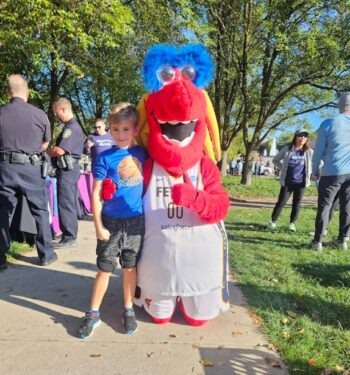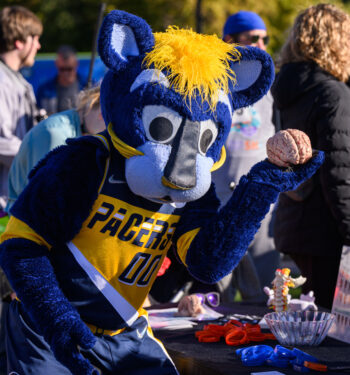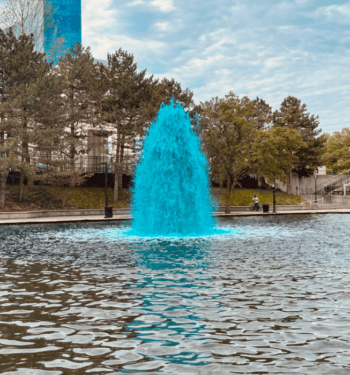September 26, 2017
In an address that included both personal history and life lessons, Maciej “Matt” Lesniak, MD, presented the 7th Annual Mealey Lecture in an informative talk titled, “Developmental Therapeutics: A Neurosurgeon’s Perspective,” on August 30 at Indiana University’s Goodman Hall Auditorium.
Lesniak is the Michael J. Marchese Professor and Chairman of the Department of Neurosurgery at Northwestern University in Chicago. The annual lecture honors John Mealy, Jr., MD, a retired Professor Emeritus of Neurosurgery in the Department of Neurological Surgery.
“Honoring Dr. John Mealey is one of our best events of the year,” said Nicholas Barbaro, MD, chair of Department of Neurological Surgery. “Today is bittersweet, however, because John passed away recently and today would have been his 83rd birthday.”
Prior to his presentation, Lesniak said he wanted to pay tribute to how pioneers such as Mealey helped shaped his career.
“I want to honor Dr. Mealey and focus on the humanistic aspect of his work and how it relates to my life, who I am, and how I came to be who I am,” he said.
“I’ll also focus on my research that is translational in nature and how you can take a concept, study it in a lab, get it funded, get it through the FDA, and how you can get a clinical trial done. Also what are some important lessons in life on the whole process.”
Lesniak discussed his life as a Poland-born student and offered gratitude for the many mentors who fueled his passion for science and medicine. He then shared details of his current research on neural stem cell virotherapy to treat malignant glioma—a condition that effects about 24,000 people each year, he reported.
Lesniak and his laboratory team of about 30 scientists are the first to gain FDA approval to inject stem cells into the human brain—the patients in the study’s first cohort will be injected with 50 million stem cells. In previous studies, Lesniak was able to demonstrate encouraging results with delivering a novel oncolytic adenovirus via a neural stem cell line in combination with radiation and chemotherapy.
He related the arduous challenge of getting the FDA approval for the clinical trial.
“From bench to bedside it took 10 years. We began in 2007 and enrolled the first patient in a Phase 1 study in May 2017,” he said. “In total it cost about $30 million, which I mostly raised myself through rounds and rounds of grant writing. We were also fortunate to have Northwestern University support our work to advance science.”
Lesniak closed his lecture on an inspiring note: a slideshow of quotes with messages of hope, courage, and perseverance.
He is a graduate of Harvard University and the Johns Hopkins University School of Medicine. He has a Master’s degree in Health Care Management from Harvard and also completed his neurosurgical and neuro-oncology training at Johns Hopkins.
—Glenda Shaw
Learn more: To read Dr. Lesniak’s first published paper on his lecture topic, go to:
Ahmed AU, Thaci B, Tobias AL, Auffinger B, Zhang L, Cheng Y, Kim CK, Yunis C, Han Y, Alexiades NG, Fan X, Aboody KS, Lesniak MS. A preclinical evaluation of neural stem cell-based cell carrier for targeted antiglioma oncolytic virotherapy. Journal of the National Cancer Institute. 2013 Jul 3; 105(13): 968-977.
PMID: 23821758
***
About the Mealey Lecture
Dr. John Mealey, Jr., joined the surgical faculty of Indiana University School of Medicine in 1960. He became a full professor in 1969, serving in this capacity until his retirement in 2000. During the 40 years he served on the Indiana University Medical School faculty, he was involved in teaching medical students and resident physicians, research and neurosurgical practice. He spent many years at the original Riley Children’s Hospital and was a founding member of The Pediatric section of The American Association of Neurological Surgeons. He died March 22, 2017 after battling pancreatic cancer.



